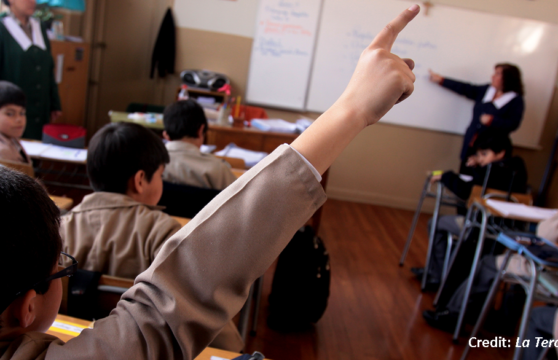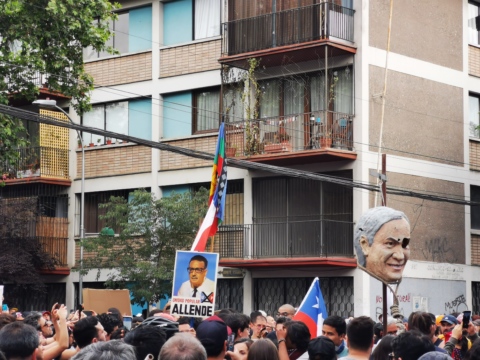
Socioeconomic School Segregation in Chile
Paper explores how market dynamics operating in the education system have impacted education in Chile.
On October 25, 2020 the Chilean people voted by an emphatic margin to approve a constitutional convention to draft a new constitution. For the first time in the history of Chile, the country will undergo a process to write a popular constitution, one written by the people in elected assemblies rather than by a dictator and his team of advisers.
The symbolic significance of a popularly written constitution is dramatic because Chile’s current constitution has its origins in the Pinochet dictatorship. After the 1973 coup, Pinochet appointed a committee led by the jurist Jaime Guzmán to draft a new constitution that would check the institutional power of the Chilean left. Pinochet’s constitution was put to a vote in a 1980 national referendum that was widely rejected as illegitimate. Following the transition to democracy, carried out under the 1980 constitution, Chile’s center-left governments achieved several rounds of constitutional reforms that removed the constitution’s most anti-democratic provisions.
Because the 2020 Chilean constitution is largely free of this anti-democratic legacy, the popular enthusiasm for drafting a new constitution is best understood as the culmination of a thirty-year process to repudiate the legacy of the Pinochet dictatorship, this time down to the very institutionality of the state, and to firmly root the source of the state’s sovereignty and legitimacy in the people rather than the military.
The Chilean people now undertake a process that will last three years before culminating in the enactment of the new constitution. In April 2021, Chileans will vote to select representatives to the Constitutional Convention, with gender parity guaranteed. Candidates are elected in the same manner as the House of Deputies but are prohibited from currently holding public office.
The newly formed Constitutional Convention will start drafting the constitution from scratch, rather than working off the current constitution. However, the new text must respect Chile’s existing international obligations. The Convention’s rules also require two-thirds support for the inclusion of all constitutional provisions. This means that the new constitution will need the support of the Chilean right, assuming that the right obtains at least one third of the seats in the April 2021 elections.
The Constitutional Convention has nine months to complete its work, but with a one-time option to extend its mandate for three more months. Then, in mid-2022, there will be a final referendum requiring a simple majority to approve the proposed constitution. The new constitution would become effective in 2023.
For the Chilean left, the drafting of a new constitution presents the opportunity to do away with the legal and institutional legacy of the Constitution of 1980. The millennial-led Frente Amplio, the Socialist Party, and the Communist Party – which together with other allied minor parties hold one third of the seats in the Congress – have dreams of turning Chile into a Nordic-style social-welfare democracy and believe that the constitution is the greatest obstacle standing in their way. Existing Constitutional doctrines like the principle of subsidiarity prevent the state from entering markets where private actors are already active, and this makes the government provisioning of public goods legally complicated.
Moreover, proponents of a new constitution have attacked the Constitutional Tribunal, a judicial body that is generally more conservative than the Congress and that has the power to veto legislation, prior to its enactment, that otherwise has the support of the President and Congress. Other developed democracies, such as the Netherlands, operate under the principle of parliamentary sovereignty and do not grant an effective veto over legislation to their high courts. The necessity of a Constitutional Tribunal, and the role of constitutionality review more broadly, is part of the constitution debate in Chile. The “blank slate” and two-thirds support requirement mean that the Chilean left can prevent these or other similar straitjacket provisions from entering the new constitution.
To those who voted “no” (rechazo) in the referendum, the constitutional process marks the first step of Chile’s descent into greater violence, social disorder, and economic depression. Though a much-mocked cliché, the voters of rechazo genuinely fear the coming of “Chilezuela.” For the most conspiratorial, the constitutional assembly could arrogate for itself full sovereign powers and displace existing democratic institutions, as happened in Venezuela in 1999 under Hugo Chávez. This would put at risk the exceptional progress Chile has made in growing its economy in the last thirty years.
The more likely outcome, however, is neither Nordic social democracy nor the Bolivarian Republic of Chile. Instead, Chile will experience two years of continued political uncertainty and attendant economic stagnation as foreign and domestic capital awaits the eventual results of the constitutional process before making any major investments. Any increase in social spending already faces strong fiscal headwinds owing to the dual blows of the 2019 social explosion and the 2020 Covid-19 pandemic.
Absent a self-defeating right-wing boycott of the Constitutional Convention elections, the two-thirds requirement will prevent the feared “radical takeover” of public institutions by the “hard left.” Chilean democracy has its problems, but this constitutional process is very distinct from that of Venezuela’s in 1999, which had a method of electing the constitutional assembly that gave an outsized supermajority to the Chavistas.
Nor will the new constitution assure universal public health, education and pensions. At most, the constitution may include aspirational promises. Perhaps a newly reformed constitutional court could take on an activist role in advancing social and economic rights, as happened in Colombia after the adoption of its 1991 constitution. But without implementing legislation, which requires majority support in Congress, newly promised social rights will likely not be worth more than the paper they are written on, just as in Venezuela. The Chilean left has overpromised its supporters and generated unrealistic expectations of material progress for the masses under a new constitution. The previous constitution undeniably made some reforms more difficult, but these issues operated at the margin.
The biggest obstacle to the establishment of a European-style welfare state in Chile is more straightforward: there has never been enough popular or electoral support. The historically influential center-left, as represented by the Christian Democratic Party, has not demonstrated a commitment to the same ambition. The Frente Amplio and Communist party, on the other hand, have never been anything more than a minority in Congress and have yet to have their presidential candidate advance to the runoff election.
As the Constitutional Convention begins its deliberations, the question remains whether Chile will continue to experience high levels of social mobilizations that at times challenged the ability of the state to maintain the rule of law. Will protesters be figuratively, or even literally, banging on the doors and walls while the Convention holds its sessions? The Covid-19 pandemic has so far kept a lid on mass protests, at least when compared to October 2019.
But Daniel Jadue, a communist mayor and the leading left-wing candidate in presidential polling, has urged continued mobilizations to serve as an oversight mechanism over the Convention. If social disorder continues to be a major issue, popular support could increase for the law-and-order right. And there is no chance the Chilean right will implement a social-welfare model given the necessary major increase in the tax burden.
A popularly written constitution marks a new founding for Chilean democracy after the Pinochet dictatorship and the subsequent decades-long transition. A new constitution will certainly broaden the range of possible political projects in the long term. But it will not assure the success of any one project in particular. Chile will still face the same grand dilemma that inspired the 2019 social explosion: how to improve the social distribution of the spoils from thirty years of astounding economic success without “killing the goose that lays the golden eggs.”
William Skewes-Cox is a third-year law student at Georgetown University specializing in human rights law and a former consultant with the Dialogue’s Peter D. Bell Rule of Law Program. He holds a master’s in Global Politics from the London School of Economics. He studied and worked in Chile for five years as a teacher and journalist. He maintains permanent residency in the country and voted in the 2020 referendum.
The Context of the Constitutional Reform in Chile: The Comparative International Experience
The Unthinkable Crisis: Chile 2019
Paper explores how market dynamics operating in the education system have impacted education in Chile.
What are the implications for the massive protests in Chile for its political balance of power?
In Chile, the second government of Sebastian Piñera in 2018 was viewed as the end of a cycle – the return of the Latin American right, together with Macri in Argentina, Duque in Colombia, and PPK in Peru. In Chile, the main threat in the presidential elections was seen as…

